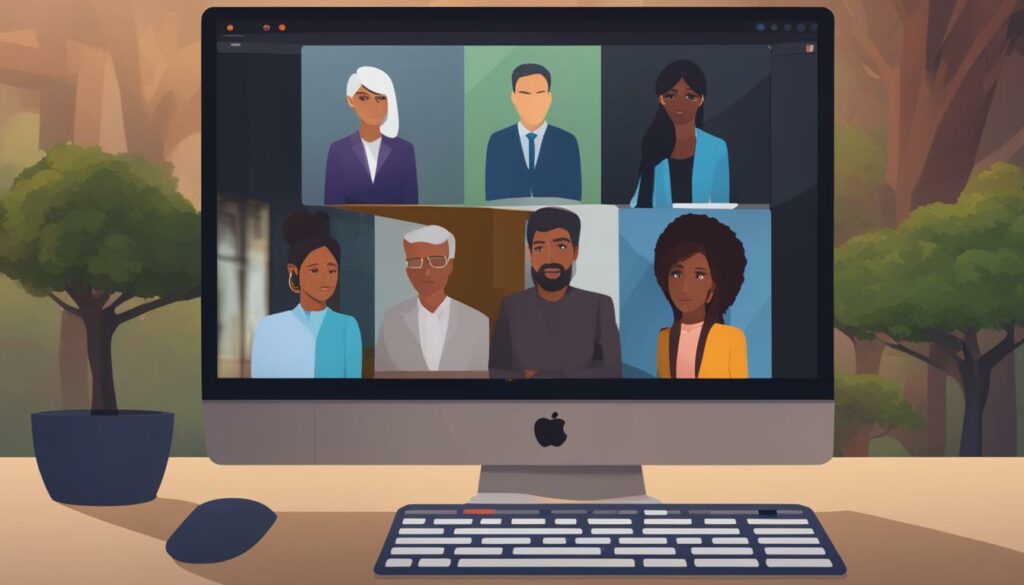Grief and bereavement are common experiences that can cause various emotional and physical symptoms. People may feel shock, sadness, tiredness, anger, and guilt in response to loss. It’s important to recognize and address these feelings. Support is available through counseling services, such as Cruse, and by talking to friends, family, or healthcare professionals. Taking care of one’s mental and physical well-being is essential during the grieving process.
Key Takeaways
- Grief and bereavement can cause a range of emotional and physical symptoms.
- Seek support from counseling services, friends, and family to help cope with loss.
- Take care of your mental and physical well-being during the grieving process.
- Cruse and other organizations provide bereavement support services.
- Remember that healing takes time, and it’s important to be patient and compassionate with yourself.
Understanding Bereavement and Loss
Grief and bereavement can take many forms, each with its own unique impact on individuals. The loss of a loved one, the end of a significant relationship, or experiencing the loss of a job or home can all trigger feelings of bereavement. While grief is a deeply personal experience, there are common symptoms that many people may encounter.
The symptoms of grief can manifest in various ways, including shock, numbness, sadness, exhaustion, anger, and guilt. These emotions may come and go unexpectedly, making the grieving process unpredictable. It’s important to remember that there is no right or wrong way to grieve. Every individual copes with loss in their own way.
To better understand the types of loss that can lead to grief, here is a comprehensive table:
| Type of Loss | Description |
|---|---|
| Death of a Loved One | The loss of a family member, friend, or pet. |
| End of a Relationship | The breakup of a romantic partnership or the loss of a friendship. |
| Loss of a Job | Being laid off, made redundant, or retiring from a career. |
| Loss of a Home | Foreclosure, eviction, or displacement due to natural disasters. |
It is important to seek support during this difficult time. Understanding the different types of loss and the symptoms of grief can help individuals navigate the grieving process and find healing in their own time.
Coping Strategies for Grief and Bereavement
Grief and bereavement can be overwhelming, but there are coping strategies that can help you navigate through this difficult time. Here are some ways to support yourself during the grieving process:
1. Seek Support
One of the most important things you can do is reach out for support. Consider joining support groups for grief and bereavement, either in person or online. These groups provide a safe space to share your feelings and experiences with others who are going through a similar journey. Talking about your emotions with a supportive friend, family member, or counselor can also provide comfort and understanding.
2. Practice Self-Care
Take care of your mental and physical well-being by practicing self-care. This can include getting enough sleep, eating a balanced diet, and engaging in regular exercise. Taking time for activities that bring you joy, such as hobbies or spending time in nature, can also help in coping with grief. Prioritizing your self-care allows you to recharge and process your emotions in a healthy way.
3. Express Your Feelings
Expressing your feelings can be cathartic and healing. Consider writing in a journal, creating art, or engaging in other forms of self-expression to process your grief. Allow yourself to cry, scream, or simply sit with your emotions when needed. Giving yourself permission to feel and express your grief can promote healing and alleviate some of the emotional burden you may be carrying.
Remember, everyone’s journey through grief is unique, and there is no “right” or “wrong” way to grieve. It’s important to be patient and kind to yourself as you navigate through this challenging time. By seeking support, practicing self-care, and expressing your feelings, you can find healthy ways to cope with grief and move towards healing.
| Coping Strategies for Grief and Bereavement |
|---|
| Seek Support |
| Practice Self-Care |
| Express Your Feelings |
Bereavement Support Services
When coping with grief and bereavement, it can be immensely beneficial to seek support from dedicated organizations and services that specialize in providing assistance to individuals experiencing loss. These bereavement support services offer a range of resources, from grief therapy to individual counseling, to help individuals navigate through their grief and find healing.
One of the key services available is grief therapy, which involves working with a trained therapist who can provide guidance and support in processing emotions and finding healthy coping mechanisms. Grief therapy sessions may be conducted on an individual basis, allowing for personalized attention and tailored strategies to meet the unique needs of each person.
Individual grief counseling is another valuable offering provided by bereavement support services. This type of counseling involves one-on-one sessions with a professional counselor who can provide a safe and compassionate space for individuals to express their feelings, work through their grief, and develop strategies for moving forward.
These services are typically available in a variety of formats, including in-person sessions, phone consultations, and online platforms, ensuring accessibility and convenience for individuals seeking support. By utilizing bereavement support services and engaging in grief therapy or individual counseling, individuals can find the guidance and tools they need to navigate the complex emotions and challenges associated with grief and bereavement.
Table: Types of Bereavement Support Services
| Service | Description |
|---|---|
| Grief Therapy | Working with a trained therapist to process emotions and find healthy coping mechanisms. |
| Individual Grief Counseling | One-on-one sessions with a professional counselor to express feelings and develop strategies for moving forward. |
| Group Support Sessions | Joining support groups to connect with others experiencing similar loss and share experiences. |
| Online Counseling | Accessing support services through online platforms, providing convenience and flexibility. |
By seeking support from bereavement support services and engaging in grief therapy or individual counseling, individuals can gain valuable insights, develop healthy coping mechanisms, and find the support they need to navigate the grieving process effectively.

Resources for Online Grief Support
Grieving the loss of a loved one can be an incredibly challenging experience, and finding support during this time is crucial. In today’s digital age, there are numerous online resources available that can provide comfort and guidance to individuals navigating the grieving process. These resources offer a range of support, including bereavement helplines, peer support networks, and informative websites.
One of the valuable online resources for grief support is Cruse, a well-known organization that offers comprehensive bereavement support services. Cruse’s website provides a wealth of information on grief and loss, including articles, videos, and practical advice for coping with the various emotional and physical challenges that come with bereavement. They also offer a bereavement helpline where individuals can seek immediate support and compassionate listening.
“Grief can be a lonely journey, but with the right support, you don’t have to navigate it alone.”
In addition to Cruse, there are numerous online communities and peer support networks that offer a safe space for individuals to share their experiences and connect with others who are also grieving. These platforms allow individuals to seek comfort and understanding from those who have had similar experiences, fostering a sense of community and support. Engaging with these communities can provide a lifeline that helps individuals feel less isolated and offers a unique form of peer support.
Benefits of Online Grief Support Resources:
- Accessibility: Online grief support is available 24/7, allowing individuals to seek help whenever they need it, regardless of their location or time constraints.
- Anonymity: Online platforms offer the option to remain anonymous, which can be particularly appealing to individuals who may feel hesitant about sharing their emotions in person.
- Diverse Perspectives: Online communities bring together people from different backgrounds and experiences, providing a broader range of perspectives and insights on grief and bereavement.
- Convenience: Accessing grief support resources online eliminates the need for travel and scheduling conflicts, making it a convenient option for individuals with busy lives or limited mobility.
Overall, online grief support resources, such as bereavement helplines, peer support networks, and informative websites, provide a valuable lifeline of support for individuals navigating the challenging journey of grief. Whether seeking immediate help or wanting to connect with others who understand the complexities of bereavement, these resources offer comfort, understanding, and inspiration for healing.
| Resource | Description |
|---|---|
| Cruse | A comprehensive bereavement support organization offering articles, videos, and a helpline for immediate support. |
| Mind | A mental health charity providing information and resources on coping with grief and bereavement. |
| Online Grief Support Communities | Online platforms that offer a sense of community and connection through sharing experiences and supporting one another. |

Grief and Bereavement Education and Workshops
Education and workshops focused on grief and bereavement can provide individuals with valuable knowledge and tools to navigate through the grieving process. These educational resources aim to increase understanding of grief, offer coping strategies, and promote self-care. Participating in workshops can provide practical exercises and techniques to support healing and emotional well-being.
One key aspect of grief education and workshops is the opportunity for compassionate listening. This involves creating a safe and supportive environment where individuals can express their feelings and emotions without judgment. Compassionate listening is a crucial component of the healing process, as it allows individuals to process their grief and find solace in sharing their experiences.
“Grief education and workshops provide individuals with the necessary tools to understand and cope with their grief. It’s important to create an environment that fosters compassionate listening, allowing individuals to express their emotions without fear of judgment.”
Grief and loss therapy is another valuable aspect of these educational programs. Trained therapists and facilitators guide individuals through the healing process, offering specialized support and strategies tailored to their unique needs. This form of therapy can provide a structured and confidential space to explore and work through the complex emotions associated with grief.
| Grief and Bereavement Education and Workshops | Compassionate Listening | Grief and Loss Therapy |
|---|---|---|
| Offers valuable knowledge and tools | Creates a safe and supportive environment | Guides individuals through the healing process |
| Increases understanding of grief | Allows individuals to express their feelings | Offers specialized support and strategies |
| Provides coping strategies | Facilitates the processing of grief | Tailored to individuals’ unique needs |
Overall, grief and bereavement education and workshops play a vital role in supporting individuals on their journey of healing. By offering knowledge, compassionate listening, and therapy, these programs provide the necessary tools for individuals to navigate and process their grief in a healthy and supportive manner.

Creating a Support Network
In times of grief and loss, it is essential to have a support network that can provide the emotional and practical assistance you need. Creating a support network involves reaching out to understanding friends, family members, and professionals who can help you manage your grief and emotions. By building a strong support system, you can find comfort, guidance, and a safe space to express your feelings.
One important aspect of creating a support network is identifying individuals who can offer empathetic listening and understanding. These are people who can listen without judgment and provide validation for your experiences. They can offer a shoulder to lean on or a listening ear when you need to talk about your feelings. Having someone who truly understands your grief can make a significant difference in the healing process.
Professional grief counselors are another invaluable resource when managing grief and emotions. These professionals specialize in helping individuals navigate the complex emotions that come with loss. They can provide guidance, coping strategies, and therapeutic interventions tailored to your unique needs. Seeking the help of a professional grief counselor can provide you with tools to process your grief and work towards healing.
“A strong support network can make all the difference in managing grief and emotions. Surrounding yourself with understanding individuals and seeking the guidance of professional grief counselors can help you navigate through the difficult journey of healing.” – Anonymous
Remember, managing grief and emotions is a personal journey, and there is no one-size-fits-all approach. Each person’s experiences and needs are unique. By creating a support network, you can find comfort, understanding, and the necessary tools to cope with your grief. Reach out to those who can offer support, and don’t hesitate to seek the help of professional grief counselors when needed.
| Benefits of a Support Network | How to Build a Support Network |
|---|---|
| 1. Emotional support during difficult times | 1. Identify understanding friends and family members |
| 2. Practical assistance with everyday tasks | 2. Seek the help of professional grief counselors |
| 3. Validation of your experiences and feelings | 3. Join support groups or online communities |
| 4. Guidance in navigating the grieving process | 4. Communicate your needs and boundaries |

Key Takeaways:
- Creating a support network is crucial when managing grief and emotions.
- Reach out to understanding friends, family members, and professionals who can provide the necessary support.
- Professional grief counselors can offer guidance and coping strategies tailored to your unique needs.
- A support network can provide emotional validation, practical assistance, and a safe space to express your feelings.
Memorial Events and Remembrance Ceremonies
When grieving the loss of a loved one, participating in memorial events and remembrance ceremonies can provide solace and healing. These events offer a space for individuals to honor and remember their loved ones who have passed away, while also fostering a sense of community and understanding amongst those who have experienced similar losses.
Attending a memorial event or remembrance ceremony allows you to come together with others who share in your grief. It provides an opportunity to reflect on cherished memories, celebrate the life of your loved one, and find comfort in the presence of others who have faced similar journeys of loss and healing.
Whether it’s a candlelight vigil, a memorial service, or a memorial walk, these events can be deeply meaningful and therapeutic. They offer a chance to express your emotions, pay tribute to your loved one, and find strength in the collective support of others. Participating in these ceremonies can play a vital role in the healing process, allowing you to navigate your grief with the companionship and understanding of a compassionate community.
| Benefits of Memorial Events and Remembrance Ceremonies |
|---|
| Opportunity to honor and remember loved ones |
| Expression of emotions in a supportive environment |
| Fostering a sense of community and understanding |
| Validation of grief experience |
| Celebration of the life of the deceased |
Participating in memorial events and remembrance ceremonies can be a meaningful way to navigate the journey of grief and find healing from loss. These events offer an opportunity to honor and remember your loved one, express your emotions, and connect with a supportive community. Remember, everyone’s grief journey is unique, and finding what works best for you is essential. Take the time to explore different memorial events and remembrance ceremonies in your area to find the ones that resonate most with your needs and values.

Support for Complex Grief
When grief extends beyond the typical mourning period and becomes prolonged, it can be incredibly challenging to manage. Known as prolonged grief disorder or complicated grief, this form of grief can persist for months or even years, significantly impacting an individual’s emotional well-being and daily life. If you find yourself experiencing prolonged grief, it is crucial to seek professional help and support.
Managing prolonged grief requires specialized assistance, and there are support services available to guide individuals through this difficult journey. Organizations like Cruse offer dedicated resources and counseling for those dealing with complicated grief. Grief counselors with expertise in prolonged grief can provide valuable guidance, coping strategies, and a safe space to express and process complex emotions.
“Prolonged grief disorder can affect various aspects of a person’s life, including their relationships, work, and overall quality of life,” says Dr. Jane Thompson, a grief counselor at Cruse. “It’s important to reach out for support and not try to navigate through this challenging experience alone.”
Support for Complicated Grief
There are several key aspects of support for complicated grief:
- Professional Counseling: Seek the assistance of grief counselors who specialize in prolonged grief. They can provide individualized support and help you develop effective coping mechanisms.
- Therapeutic Interventions: Various therapeutic interventions, such as cognitive-behavioral therapy (CBT) and eye movement desensitization and reprocessing (EMDR), have shown promise in treating complicated grief.
- Support Groups: Connecting with others who have experienced or are experiencing similar grief can provide reassurance, validation, and a sense of belonging.
- Self-Care Practices: Engaging in self-care activities, such as regular exercise, journaling, and relaxation techniques, can help manage stress and promote emotional well-being.
Remember that each individual’s grief journey is unique, and there is no set timeline for healing. Take the time you need and be patient with yourself as you navigate through this complex and challenging process. Seek the support that is available to you and remember that healing and hope are possible, even in the face of complicated grief.

Conclusion
Grief and bereavement are natural and personal experiences that can have significant emotional and physical impacts. It’s essential to recognize and address these feelings and seek support when needed. Various resources, including bereavement counseling services, support groups, online platforms, and educational workshops, are available to provide guidance and support during the grieving process.
Remember that healing takes time, and it’s important to be patient and compassionate with oneself while navigating through grief and loss. Coping with loss requires personal strength and resilience, but it’s crucial to know that you don’t have to face it alone. Seeking grief and bereavement support can provide the necessary tools and understanding to navigate through this challenging journey.
Whether you choose to lean on the support of friends and family, join a bereavement support group, or seek professional help from counselors, remember that you deserve compassion and care during this time. Grief is a natural part of the human experience, and it’s important to take the necessary steps towards healing and finding peace.
FAQ
What are common symptoms of grief and bereavement?
Common symptoms of grief and bereavement include shock, sadness, tiredness, anger, and guilt in response to loss.
How can I cope with grief and bereavement?
Strategies for coping with grief and bereavement include talking about your feelings, joining support groups, practicing self-care, and seeking professional help when needed.
Where can I find bereavement support services?
Bereavement support services are available through organizations such as Cruse, which offer grief therapy, individual counseling, and group sessions.
Are there online resources available for grief support?
Yes, websites like Cruse and Mind provide information and resources for understanding and managing grief. Additionally, bereavement helplines and online communities offer support and a safe space for sharing experiences.
What educational resources are available for grief and bereavement?
Educational resources and workshops can provide knowledge and tools for navigating through grief. These resources may cover topics such as understanding grief, coping strategies, and self-care.
How can I create a support network during grief and bereavement?
Surrounding yourself with understanding friends, family members, and professionals can provide a strong support network. Professional grief counselors can offer guidance and expertise in helping you navigate through your emotions.
What are memorial events and remembrance ceremonies?
Memorial events and remembrance ceremonies provide a space to honor and remember loved ones who have passed away. They can offer healing and a sense of closure, as well as a chance to connect with others who are also grieving.
What support is available for complex grief?
For individuals experiencing prolonged or complicated grief, professional help and support are crucial. Services such as Cruse provide specialized assistance for managing complex grief and guiding individuals towards healing.
Where can I find grief and bereavement support?
Various resources, including counseling services, support groups, online platforms, and educational workshops, are available to provide guidance and support during the grieving process.
How long does the grieving process take?
The grieving process is unique to each individual and can take time. It’s important to be patient and compassionate with yourself as you navigate through grief and loss.

